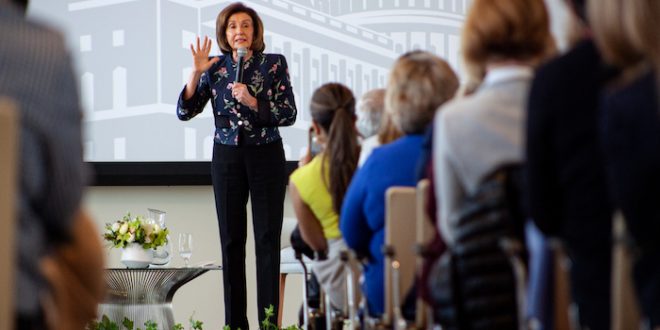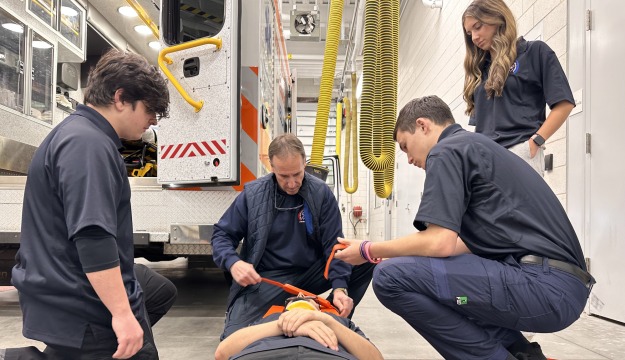By Katie Lannan
State House News Service
Massachusetts stands to receive $12 billion in aid, plus another $1.5 billion for its school districts and higher education campuses, in a massive $3 trillion relief package that passed the U.S. House Friday, according to Congresswoman Lori Trahan.
But the bill, House Democrats’ proposal for a fourth phase of COVID-19 aid legislation, is on track to meet a dead end, at least in its current form, although it could eventually become a launching point for House-Senate talks and its fate could be determined by unfolding COVID-19 impacts and election year politics.
The White House has said President Trump’s advisors would recommend he veto it, saying the bill is focused on “delivering on longstanding partisan and ideological wishlists.” Senate Majority Leader Mitch McConnell has used similar language, also describing it as a “parade of absurdities.” Trump said Thursday that the bill is “dead on arrival” and that House Speaker “Nancy Pelosi knows that.”
Congressman William Keating, who joined Trahan and other New England Democrats on a conference call with reporters Friday to urge the Senate to follow the House’s lead in swiftly passing the bill, pushed back against Republicans’ criticisms. He said the package instead addresses “nuts and bolts” issues and the core needs of workers, states and local governments.
“This isn’t a wishlist, as I think you might hear,” Keating said. “This is directly focused on all the critical needs that we have, and I do believe that you’re going to see these things included as we move forward.”
Dubbed the HEROES Act, the expansive bill would steer nearly $1 trillion in aid to state, local, territorial and tribal governments; create a $200 billion fund to provide hazard pay to essential workers; allocate $75 billion for COVID-19 testing, tracing, isolation and treatment; send another round of direct stimulus payments to taxpayers, of up to $6,000 per household; and extend federal unemployment benefits, among other measures.
Keating said New Bedford alone would receive almost $200 million in direct payments, and Trahan said cities in her district like Lowell, Lawrence and Haverhill would benefit from “much-needed relief” to help stabilize their budgets.
“If we don’t pass this bill, local governments will continue to operate on the brink of bankruptcy,” she said.
In late March, Trahan estimated the $2 trillion federal CARES Act, which became law, would direct about $2.67 billion to Massachusetts in aid to state government, and $1 billion to preserve public transit jobs.
With local budgets strained by pandemic-related spending and the limited revenues that come from a near-total economic shutdown, Rhode Island Congressman David Cicilline said front-line workers like police officers, firefighters and emergency medical technicians are “at risk of losing their jobs as they risk their lives to care for us.” Teachers, who have been forced to adapt to remote education amid widespread school closures, also face the risk of job cuts, he said.
Congressman Peter Welch of Vermont said the federal government is the only entity with the capacity and fiscal flexibility to step in and provide a “lifeline.”
“The impact of this has been brutal and widespread, and the fact is that there’s an immense amount of dislocation and anxiety and suffering for individuals economically, but it’s also all of our institutions,” Welch said. “Our restaurant and hospitality industry is just devastated.”
Pelosi has indicated she’s open to negotiation on the fourth round of relief legislation, and Cicilline said the Senate’s options include amending the House bill or passing its own legislation, which would set up conference committee talks. Cicilline said the House “put together a piece of legislation that responded to the gravity of the moment.”
“Inaction is not an option,” he said.
Both the White House and Senate leadership have highlighted measures they want to see in whatever version of legislation ultimately is pursued.
“When additional legislation is contemplated, it should include a payroll tax holiday, safeharbor provisions to protect businesses from frivolous lawsuits, permitting reform to facilitate infrastructure projects, and other policies to spur our economic comeback,” reads a statement of Trump administration policy.
McConnell said in a Fox News interview that his “red line” is “liability protections for those who are brave enough to begin to open up the economy again in the wake of the trial lawyers who are descending already on hospitals and doctors and businesses as of about a week and a half ago.”
 New Bedford Guide Your Guide to New Bedford and South Coast, MA
New Bedford Guide Your Guide to New Bedford and South Coast, MA







